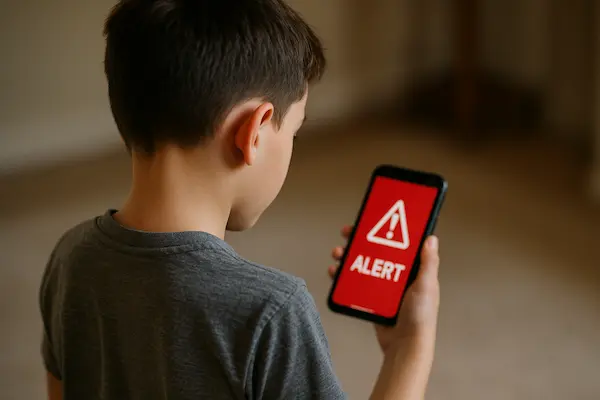DIGITAL SEXUAL EXPOSURE TO MINORS
Illegal exposure occurs when a person intentionally displays sexual or pornographic material to a child or adolescent. This material may include images, audio recordings, videos, or any type of digital content with explicit sexual connotation.
What matters is that this act is committed through technologies such as email, instant messaging applications (like WhatsApp or Telegram), social media platforms, or any other means of digital data transmission. Physical contact is not required, nor does the offender need to have produced the material themselves; simply transmitting or exposing the content to a minor constitutes a criminal offense.
For example, if an adult sends pornographic videos to a teenager via a messaging platform, it qualifies as a criminal act, regardless of whether the minor requested the content or not.
PENALTIES FOR DIGITAL SEXUAL EXPOSURE TO MINORS
According to current criminal law in Bolivia, this conduct is punishable by imprisonment for a period of three to six years. The penalty aims to effectively safeguard the psychological and emotional well-being of children and adolescents from content that could harm their overall development.
If the victim is under 12 years of age, the penalty is increased by one-third, recognizing the heightened vulnerability of younger children and the corresponding need for enhanced legal protection.

RECOMMENDATIONS TO PREVENT DIGITAL SEXUAL EXPOSURE TO MINORS
It is essential for guardians and caregivers to remain vigilant about the digital device usage of children and adolescents and to monitor the platforms they access. Inappropriate content may be transmitted by unknown contacts, fake accounts, or even individuals within the minor’s close social environment.
Furthermore, awareness of this type of crime enables quicker action. If there is suspicion or evidence that a minor has been exposed to such content, it is crucial to report the incident to the appropriate authorities. Crimes against the integrity of minors are considered public offenses, and legal action is mandatory.
CONCLUSION
The digital space must not become an unsafe environment for children. Bolivian criminal law sets forth clear penalties for those who expose minors to sexual content, recognizing the harmful impact such material can have on their development. Penalties are increased if the victim is under 12 years of age, in line with Bolivia’s enhanced child protection legal framework.
Our law firm provides specialized legal services in cybercrime and child and adolescent protection. If you are facing a similar situation or require legal advice, do not hesitate to contact our professional team.
Frequently Asked Questions (FAQs)
What type of content is considered “sexual” or “pornographic”?
Any visual or audio material that depicts explicit sexual acts, nudity with erotic intent, or any content intended to provoke sexual arousal.
Does this penalty apply if the content was sent by mistake?
If it is proven that there was no intent to expose the minor, criminal liability may be excluded. However, this depends on the specific circumstances of the case and the evaluation made by the Public Prosecutor’s Office.
What should I do if my child has received this type of content?
Preserve the evidence, do not delete it, and contact the FELCV (Special Force to Fight Violence) or the Public Prosecutor’s Office to file a formal report.
What happens if the perpetrator is also a minor?
In such cases, socio-educational measures are applied under the juvenile justice system, taking into account the offender’s age and level of responsibility.
The content of this article does not reflect the technical opinion of Rigoberto Paredes & Associates and should not be considered a substitute for legal advice. The information presented herein corresponds to the date of publication and may be outdated at the time of reading. Rigoberto Paredes & Associates assumes no responsibility for keeping the information in this article up to date, as legal regulations may change over time.



